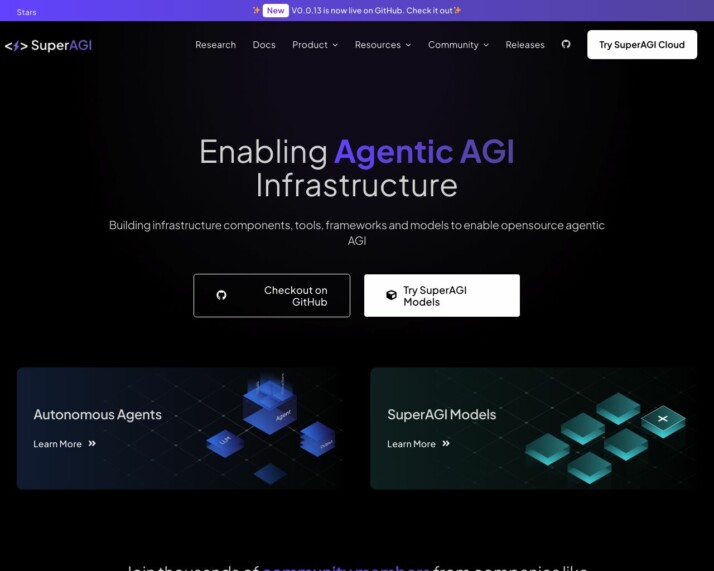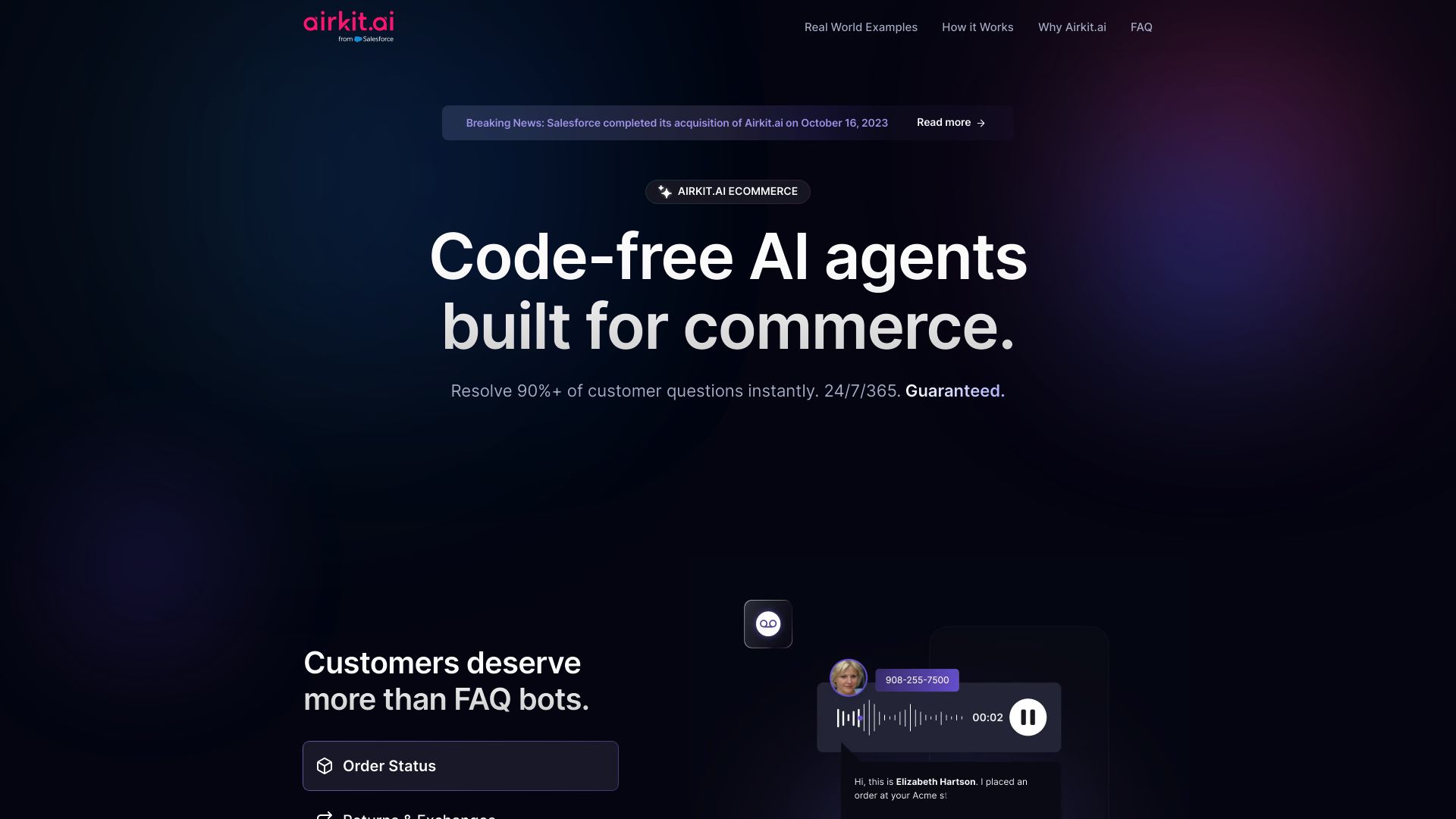SuperAGI vs. Airkit AI: Comparing Open-Source and No-Code AI Platforms
AI agent platforms revolutionize how businesses automate tasks, enhance productivity, and deliver exceptional customer experiences. This review compares SuperAGI, an open-source framework for building autonomous AI agents, with Airkit AI, a no-code platform for ecommerce customer support automation. We’ll examine their core features, ease of use, and suitability for different business needs. Whether you’re a developer seeking powerful customization or a business leader looking for rapid AI deployment, this comparison will help you navigate the AI landscape and choose the right solution. We’ll also introduce SmythOS, a versatile platform that combines the best of both worlds, offering advanced AI capabilities with user-friendly design.
SuperAGI Overview
SuperAGI offers an open-source platform for creating, managing, and deploying autonomous AI agents. The framework empowers developers to build intelligent systems capable of reasoning, decision-making, and task execution without constant human oversight.


SuperAGI Website Screeenshot
SuperAGI offers an open-source platform for creating, managing, and deploying autonomous AI agents … capable of reasoning, decision-making, and task execution without constant human oversight.
At its core, SuperAGI leverages Large Language Models (LLMs) and Large Action Models (LAMs) to enable sophisticated AI agents. These agents excel in software development tasks, demonstrating SuperAGI’s focus on revolutionizing the coding process. The platform’s flagship offering, SuperCoder 2.0, showcases highly accurate Python code generation, streamlining software development workflows.
SuperAGI distinguishes itself through extensive tool integration, supporting popular services like Slack, GitHub, and Zapier. This versatility allows agents to seamlessly interact with diverse applications, expanding their utility across various domains. The platform’s user-friendly graphical interface simplifies agent management, making it accessible to users with varying technical expertise.
Key features of SuperAGI include concurrent agent execution, Docker-based installation for simplified setup, and robust memory capabilities. These elements combine to create a powerful ecosystem for AI agent development and deployment. The platform also prioritizes security and compliance, integrating with existing developer tools like Jira and Jenkins to ensure smooth adoption in professional environments.
Key features of SuperAGI include concurrent agent execution, Docker-based installation for simplified setup, and robust memory capabilities.
While SuperAGI offers impressive capabilities, it may present a steeper learning curve for non-technical users due to its code-centric approach. The lack of a visual builder or no-code editor could limit accessibility for those seeking a more intuitive agent creation process. Additionally, the platform’s strong focus on software development may require adaptation for users in other industries seeking more generalized AI solutions.
Airkit AI Overview
Airkit AI empowers businesses to deploy intelligent, no-code AI agents for automated customer support in ecommerce. Recently acquired by Salesforce, Airkit’s platform enables rapid creation of AI-powered assistants that resolve common queries related to orders, returns, and product information.


Airkit’s cloud-based solution deploys AI agents within hours, without coding requirements. The platform offers pre-built conversational skills tailored for ecommerce, seamlessly integrating with existing help desk and CRM systems. These AI agents instantly resolve over 90% of repetitive customer requests, improving efficiency and preventing agent burnout.
Airkit’s AI agents instantly resolve over 90% of repetitive customer requests, improving efficiency and preventing agent burnout.
The platform’s strengths lie in its industry-specific focus and ease of use. Airkit’s AI agents continuously learn and improve resolutions over time, providing personalized, 24/7 support. However, the narrow focus on ecommerce may limit its applicability in other industries.
Airkit’s acquisition by Salesforce aims to enhance customer service capabilities across the Salesforce ecosystem. This integration promises to deliver powerful, AI-driven support solutions to a broader audience of enterprises. While this move strengthens Airkit’s position, it may also impact its flexibility and independence as a standalone solution.
Feature Comparison
SuperAGI and Airkit AI offer distinct approaches to AI agent development, with notable differences in their core capabilities and target applications. SuperAGI provides a comprehensive framework for building autonomous AI agents capable of complex reasoning and decision-making, particularly excelling in software development tasks. Its open-source nature and support for concurrent agent execution make it appealing to developers and organizations seeking customizable AI solutions.
Airkit AI, on the other hand, focuses on delivering no-code AI agents specifically tailored for ecommerce customer support. Recently acquired by Salesforce, Airkit’s platform enables rapid deployment of AI assistants that can handle common queries related to orders, returns, and product information. While Airkit offers pre-built conversational skills and seamless integration with existing CRM systems, it lacks the broader application scope and advanced features found in SuperAGI.
A significant feature gap exists in the visual building capabilities. SuperAGI relies primarily on code-based configuration, potentially limiting accessibility for non-technical users. Airkit AI addresses this with its no-code approach, allowing businesses to deploy AI agents quickly without programming expertise. However, this ease of use comes at the cost of reduced customization options compared to SuperAGI’s more flexible framework.
In terms of security and compliance, SuperAGI offers features like constrained alignment and API key authentication, crucial for enterprise deployments. Airkit AI’s integration with Salesforce likely provides robust security measures, but specific details on data encryption and access control are not as clearly defined in the available information.
Feature Comparison Table
| SuperAGI | Airkit AI | SmythOS | |
|---|---|---|---|
| CORE FEATURES | |||
| Visual Builder | ❌ | ❌ | ✅ |
| No-Code Options | ❌ | ✅ | ✅ |
| Explainability & Transparency | ✅ | ❌ | ✅ |
| Debug Tools | ✅ | ❌ | ✅ |
| Multimodal | ✅ | ❌ | ✅ |
| Multi-Agent Collaboration | ✅ | ❌ | ✅ |
| Audit Logs for Analytics | ✅ | ❌ | ✅ |
| Work as Team | ✅ | ❌ | ✅ |
| Agent Work Scheduler | ✅ | ❌ | ✅ |
| SECURITY | |||
| IP Control | ❌ | ❌ | ✅ |
| COMPONENTS | |||
| Foundation AIs | ✅ | ❌ | ✅ |
| Huggingface AIs | ✅ | ❌ | ✅ |
| Zapier APIs | ✅ | ❌ | ✅ |
| Classifiers | ✅ | ❌ | ✅ |
| Logic | ✅ | ❌ | ✅ |
| Data Lakes | ❌ | ❌ | ✅ |
| DEPLOYMENT OPTIONS (EMBODIMENTS) | |||
| Deploy as API | ✅ | ❌ | ✅ |
| Deploy as Webhook | ✅ | ❌ | ✅ |
| Staging Domains | ❌ | ❌ | ✅ |
| API Authentication (OAuth + Key) | ✅ | ❌ | ✅ |
| Deploy as Scheduled Agent | ✅ | ❌ | ✅ |
| Deploy as GPT | ✅ | ❌ | ✅ |
| DATA LAKE SUPPORT | |||
| Hosted Vector Database | ✅ | ❌ | ✅ |
| Sitemap Crawler | ❌ | ❌ | ✅ |
| YouTube Transcript Crawler | ❌ | ❌ | ✅ |
| URL Crawler | ✅ | ❌ | ✅ |
| PDF Support | ✅ | ❌ | ✅ |
| Word File Support | ✅ | ❌ | ✅ |
| TXT File Support | ✅ | ❌ | ✅ |
Best Alternative to SuperAGI and Airkit AI
SmythOS emerges as the superior alternative to SuperAGI and Airkit AI, offering a comprehensive platform for AI agent development and deployment. Our solution combines powerful features with unparalleled ease of use, making it the ideal choice for businesses and developers seeking to harness the full potential of AI automation.
Unlike SuperAGI’s code-heavy approach or Airkit AI’s limited focus on ecommerce support, SmythOS provides a versatile, drag-and-drop interface that empowers users to create sophisticated AI agents without extensive programming knowledge. This visual builder democratizes AI development, allowing teams to rapidly prototype and deploy intelligent solutions across various industries and use cases.
SmythOS provides a versatile, drag-and-drop interface that empowers users to create sophisticated AI agents without extensive programming knowledge.
SmythOS excels in its extensive integration capabilities, supporting a wide array of AI models, APIs, and tools. While SuperAGI offers some integrations, and Airkit AI focuses primarily on CRM systems, our platform seamlessly connects with popular services like Slack, GitHub, and Zapier, as well as custom APIs. This flexibility ensures that SmythOS can adapt to virtually any workflow or business process, maximizing the value of existing technology investments.
Security and scalability set SmythOS apart from its competitors. We offer robust features such as data encryption, OAuth authentication, and IP control, addressing enterprise-level concerns that SuperAGI and Airkit AI may overlook. Our platform’s ability to handle complex, multi-agent systems and deploy AI solutions across various environments (including as APIs, webhooks, and scheduled agents) demonstrates its readiness for production-grade applications at scale.
By choosing SmythOS, users gain access to a feature-rich ecosystem that includes advanced capabilities like multimodal interactions, hosted vector databases, and sophisticated data crawling tools. These features, combined with our intuitive interface and comprehensive support, make SmythOS the clear choice for organizations looking to leverage AI technology effectively and efficiently across unlimited use cases.
Conclusion
SuperAGI and Airkit AI offer unique approaches to AI agent development, each with distinct strengths. SuperAGI provides a comprehensive framework for building autonomous AI agents, excelling in software development tasks. Its open-source nature and support for concurrent agent execution appeal to developers seeking customizable solutions. Airkit AI, now part of Salesforce, focuses on no-code AI agents for ecommerce customer support, enabling rapid deployment of assistants for common queries.
While both platforms have their merits, SmythOS emerges as the superior choice for businesses seeking a versatile, user-friendly AI agent development platform. Our drag-and-drop interface simplifies complex AI workflows, making advanced capabilities accessible to users with varying technical expertise. With support for over 300,000 integrations and compatibility with numerous AI models, SmythOS offers unparalleled flexibility and scalability.
SmythOS stands out with its “Create Once, Deploy Anywhere” approach, allowing seamless integration across multiple environments. This versatility, combined with features like multi-agent orchestration and extensive deployment options, positions SmythOS as the ideal solution for businesses looking to harness AI’s full potential. Whether you’re automating customer support, streamlining operations, or developing innovative AI applications, SmythOS provides the tools and flexibility to bring your ideas to life.
To experience the power of SmythOS firsthand, we invite you to create a free account and explore our diverse range of AI-powered agent templates. Discover how SmythOS can revolutionize your approach to AI development and deployment, driving efficiency and innovation across your organization. Get started with SmythOS today and unlock the future of AI-powered automation.
Last updated:
Disclaimer: The information presented in this article is for general informational purposes only and is provided as is. While we strive to keep the content up-to-date and accurate, we make no representations or warranties of any kind, express or implied, about the completeness, accuracy, reliability, suitability, or availability of the information contained in this article.
Any reliance you place on such information is strictly at your own risk. We reserve the right to make additions, deletions, or modifications to the contents of this article at any time without prior notice.
In no event will we be liable for any loss or damage including without limitation, indirect or consequential loss or damage, or any loss or damage whatsoever arising from loss of data, profits, or any other loss not specified herein arising out of, or in connection with, the use of this article.
Despite our best efforts, this article may contain oversights, errors, or omissions. If you notice any inaccuracies or have concerns about the content, please report them through our content feedback form. Your input helps us maintain the quality and reliability of our information.
